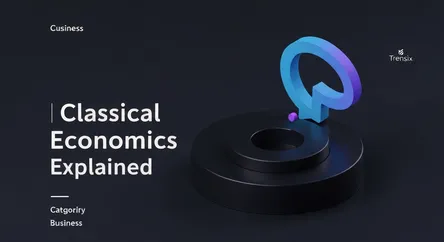Business
Classical Economics Explained

Discover Classical Economics, the theory promoting free markets and limited government intervention. Learn its core principles and modern relevance.
What is it?
Classical Economics, pioneered by Adam Smith, is an 18th-century school of thought championing free markets. Its core idea is "laissez-faire," meaning minimal government intervention. The theory posits that an "invisible hand" guides an economy, where individual self-interest inadvertently benefits society. It argues that markets are self-regulating and naturally move toward equilibrium, with national wealth generated through production, division of labor, and free trade.
Why is it trending?
Classical principles are foundational to many modern economic debates. Its ideas constantly resurface in discussions about deregulation, tax cuts, and the role of government, especially when inflation is a concern. The ongoing global tension between free trade and protectionist policies keeps classical arguments for open markets highly relevant. It provides the intellectual basis for many libertarian and free-market political platforms, ensuring its continued presence in policy discussions.
How does it affect people?
Classical policies directly impact daily life. They can lead to lower consumer prices and a wider variety of goods through free trade and deregulation. On the flip side, this approach may result in reduced social safety nets, greater income inequality, and weaker environmental protections. For individuals, a strict classical stance during a recession could mean prolonged unemployment as the government refrains from intervening, directly affecting household financial stability.